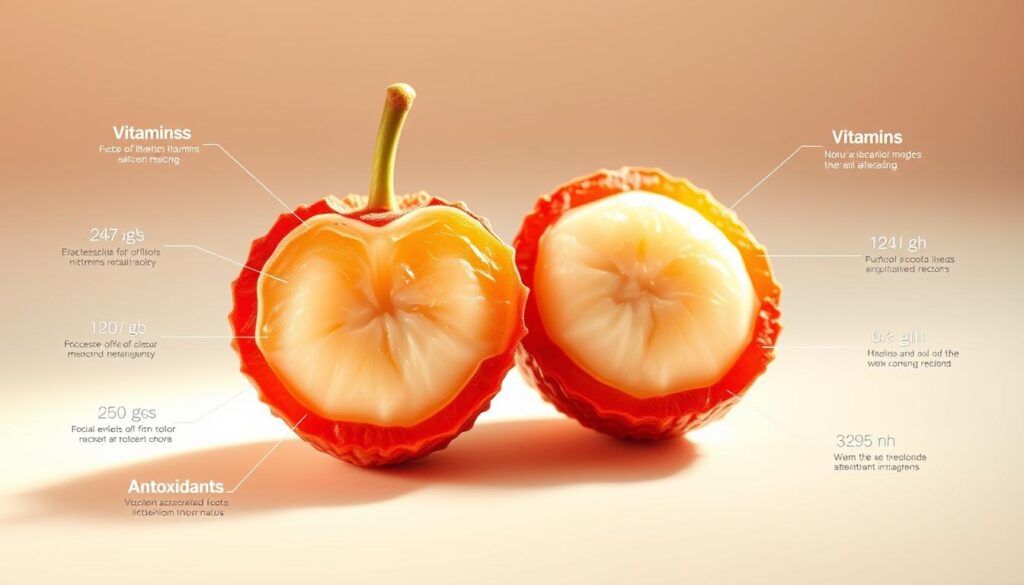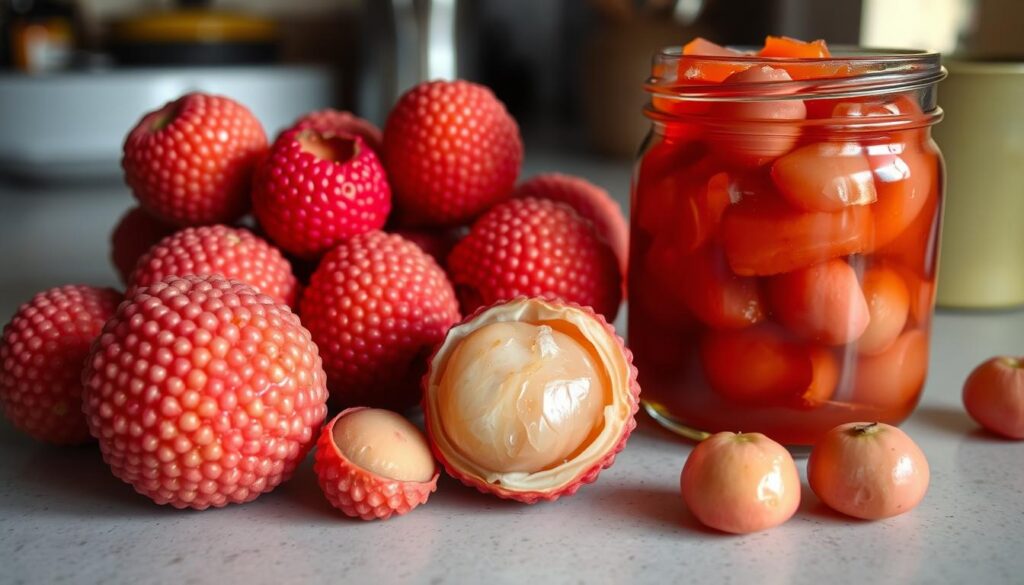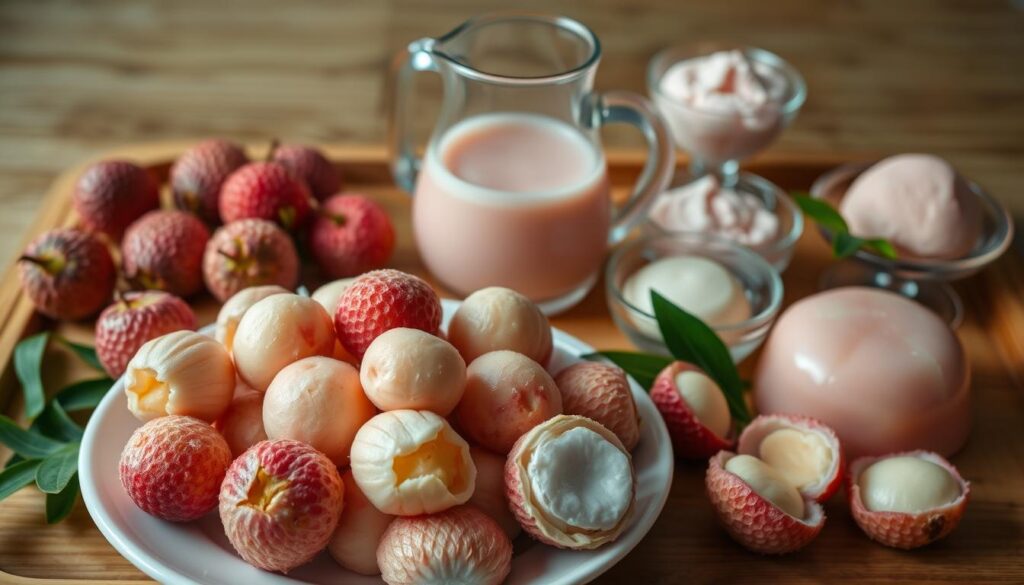Can a small, tropical fruit with a rough, red exterior and sweet pulp be a powerhouse of health benefits? Lychee, a delicacy in many Asian cultures, has been cherished for thousands of years, not just for its unique taste but also for its impressive nutritional profile.
This tropical fruit is rich in essential vitamins, minerals, and antioxidants that support overall wellness. With its cultivation spanning across various regions including India, Vietnam, Indonesia, Australia, and the U.S., lychee is becoming increasingly accessible.
Key Takeaways
- Lychee is a nutrient-rich fruit that offers numerous health benefits.
- It is an excellent source of vitamins, minerals, and antioxidants.
- Lychee supports overall wellness and can be a great addition to a healthy diet.
- The health benefits of lychee have been valued for thousands of years.
- Lychee is now cultivated in many regions around the world.
What is Lychee Fruit?
Lychee, a drupe fruit with a single seed, is often misunderstood as a berry. It’s a member of the soapberry family, which includes other fruits like plums, apricots, peaches, and nectarines. The lychee tree, an evergreen that can grow up to 40-50 feet tall, produces clusters of this delicious lychee.
Origin and History
The lychee has a rich history that dates back to ancient China, where it was considered a symbol of good fortune and prosperity. Originating in the southern provinces, lychee cultivation spread throughout Asia over centuries.
Historical records show that lychee was a favorite among Chinese nobility, with the fruit being served at royal banquets and used as a form of tribute to the emperors.
Physical Characteristics and Varieties
Lychee fruit is instantly recognizable due to its unique appearance: a rough, reddish peel that covers translucent, pearly white flesh with a single dark brown seed at the center.
- Typically measuring 1.5-2 inches in diameter, lychee grows in loose clusters.
- The flavor profile is uniquely sweet with subtle floral notes, often compared to a blend of grapes, pears, and roses.
- Several varieties are cultivated worldwide, including Brewster, Emperor, Mauritius, and Sweetheart, each with slight variations in size, sweetness, and seed-to-flesh ratio.
While often confused with its close relatives like rambutan and longan, lychee is distinguished by its pronounced sweetness and distinctive texture.
Nutritional Profile of Lychee Fruit
Rich in essential vitamins, minerals, and antioxidants, lychee fruit is a nutrient-dense food. Understanding its nutritional profile can help appreciate its value in a healthy diet.
Vitamins and Minerals
Lychee fruit is a good source of various vitamins and minerals. It is particularly rich in vitamin C, providing a significant portion of the daily recommended intake. Additionally, lychee contains potassium, copper, and other essential minerals that contribute to overall health.
Antioxidants and Polyphenols
The fruit is also rich in antioxidants and polyphenols, which play a crucial role in protecting the body against free radicals and oxidative stress. These compounds help in reducing inflammation and may contribute to the prevention of chronic diseases.
Caloric Content and Macronutrients
A 100-gram serving of fresh lychee fruit contains approximately 66 calories, making it a relatively low-calorie snack. The macronutrient breakdown shows that lychee is primarily composed of carbohydrates, with about 16.5 grams per 100-gram serving, of which 15.2 grams are naturally occurring sugars. It contains minimal fat (0.44 grams) and a small amount of protein (0.83 grams). The fruit also provides about 1.3 grams of dietary fiber, contributing to its satiating quality and supporting digestive health.

The nutritional profile of lychee fruit highlights its potential as a healthy addition to a balanced diet. With its low caloric content and rich nutrient profile, lychee can be a great choice for those looking for a nutritious and flavorful snack.
Top Lychee Fruit Benefits for Health and Wellness
Lychee fruit is a nutritional powerhouse, offering numerous health benefits that can enhance overall wellness. This tropical fruit is not only delicious but also packed with essential nutrients, antioxidants, and bioactive compounds that contribute to its various health-promoting properties.
Powerful Antioxidant Properties
Lychee fruit is rich in antioxidants, including vitamin C, flavonoids, and other polyphenolic compounds. These antioxidants play a crucial role in protecting the body against oxidative stress and damage caused by free radicals. The high antioxidant content in lychee fruit helps to neutralize harmful free radicals, potentially reducing the risk of chronic diseases such as heart disease, cancer, and neurodegenerative disorders.
Research has shown that the antioxidant properties of lychee fruit may also help to protect against certain types of cancer. A study published in a reputable scientific journal found that lychee extract exhibited significant anti-cancer effects in vitro.
Immune System Support
Lychee fruit is an excellent source of vitamin C, a nutrient that is essential for a healthy immune system. The high vitamin C content in lychee fruit helps to stimulate the production of white blood cells, which are vital for fighting off infections and diseases. Regular consumption of lychee fruit may help to boost the immune system, reducing the risk of illnesses such as the common cold and flu.
Heart Health Promotion
The nutrients and antioxidants present in lychee fruit may also contribute to heart health. The fiber, potassium, and antioxidants in lychee fruit help to support healthy blood pressure and cholesterol levels. A diet rich in fruits like lychee may help to reduce the risk of cardiovascular disease.
| Nutrient | Amount per 100g | Benefit |
|---|---|---|
| Potassium | 171 mg | Supports healthy blood pressure |
| Fiber | 1.3 g | Helps lower cholesterol levels |
| Vitamin C | 71.5 mg | Antioxidant properties |
Skin Health and Anti-Aging Effects
The antioxidants and vitamin C in lychee fruit may also have anti-aging effects on the skin. The antioxidant properties help to protect the skin from damage caused by UV radiation and environmental stressors, potentially reducing the appearance of fine lines and wrinkles.
“The antioxidant and vitamin C content in lychee fruit makes it a valuable ingredient in skincare products, potentially helping to improve skin texture and reduce signs of aging.”
Digestive Health Benefits
Lychee fruit is a good source of dietary fiber, which is essential for maintaining healthy digestion. The fiber content in lychee fruit helps to regulate bowel movements, prevent constipation, and support the growth of beneficial gut bacteria.
Brain Function and Cognitive Support
Some studies suggest that the nutrients and antioxidants in lychee fruit may have neuroprotective effects, potentially supporting brain health and cognitive function. The antioxidant properties may help to protect against age-related cognitive decline and neurodegenerative diseases.
Liver Protection Properties
Lychee fruit contains compounds that may help to protect the liver from damage. The antioxidant and anti-inflammatory properties of lychee fruit may help to reduce liver inflammation and promote overall liver health.
Weight Management Support
Lychee fruit is low in calories and high in fiber, making it a nutritious addition to a weight management diet. The fiber content helps to promote feelings of fullness, potentially reducing the risk of overeating.

Blood Sugar Regulation
Despite its sweet taste, lychee fruit has a relatively low glycemic index compared to many sweet foods. This means that it causes a more gradual rise in blood sugar levels than processed sweets or sugary beverages. The fiber content in lychee fruit also helps to slow the absorption of sugars into the bloodstream, contributing to more stable blood sugar levels after consumption.
- Lychee fruit has a low glycemic index, making it a better choice for those monitoring their blood sugar levels.
- The fiber in lychee fruit helps to regulate the absorption of sugars, supporting more stable blood sugar levels.
- Certain polyphenolic compounds in lychee may help improve insulin sensitivity, potentially supporting better blood sugar regulation over time.
For individuals with diabetes, it’s essential to consume lychee fruit in moderation and be mindful of portion sizes due to its natural sugar content. Fresh lychee is generally a better choice than dried or canned varieties, which often contain added sugars or concentrated natural sugars.
Potential Side Effects and Precautions
While lychee fruit is generally considered safe to eat, there are certain precautions to be aware of to fully enjoy its nutritional benefits. As with any food, understanding the potential side effects is crucial for safe consumption.
Allergic Reactions
Some individuals may be allergic to lychee fruit. Symptoms of an allergic reaction can range from mild discomfort to severe reactions such as anaphylaxis. It is essential to introduce lychee cautiously, especially if you have known allergies to other fruits. If you experience any adverse reactions, discontinue consumption and consult a healthcare professional.
Hypoglycemia Risk
There have been documented cases of hypoglycemia associated with the consumption of lychee, particularly in undernourished children who eat large quantities on an empty stomach. Ensuring a balanced diet and not overconsuming lychee can mitigate this risk.
Medication Interactions
Lychee fruit may interact with certain medications, affecting their efficacy or increasing the risk of side effects. Individuals on multiple medications should be cautious and consult their healthcare provider if they plan to consume lychee regularly.
Considerations for Special Populations
Certain groups should consume lychee with caution. For instance, pregnant and breastfeeding women should eat it in moderation due to limited research on its safety in these populations. Children, especially those who are undernourished, should avoid consuming large quantities of lychee. Individuals with diabetes should monitor their blood sugar levels when eating lychee due to its natural sugar content.
- Pregnant and breastfeeding women should consume lychee in moderation.
- Children, particularly undernourished ones, should avoid large quantities of lychee.
- Individuals with diabetes should monitor their blood sugar levels.
- People with known fruit allergies should introduce lychee cautiously.
- Elderly individuals with multiple medications should be mindful of potential drug interactions.
How to Select and Store Lychee Fruit
The key to savoring lychee fruit lies in understanding the right methods for its selection and storage. Fresh lychees are highly perishable, making proper handling crucial from the moment they’re picked.
Choosing Ripe Lychees
When selecting lychees, look for fruit that is brightly colored and slightly soft to the touch, as this indicates ripeness. Avoid lychees with brown or wilted skin, as they may be past their prime. The stem should be fresh and slightly indented where the lychee was plucked from the tree.
Proper Storage Methods
To keep lychees fresh, they should be refrigerated promptly after purchase. Ideally, store them in a perforated plastic bag to allow for air circulation while retaining moisture. Fresh lychees can be refrigerated for 5-10 days. For longer storage, they can be frozen whole with their peels on or dried to make lychee nuts, which can be stored at room temperature for up to a year.

Proper storage not only extends the shelf life of lychees but also preserves their nutritional value and flavor. Whether you choose to refrigerate, freeze, or dry your lychees, following the right storage methods ensures you can enjoy this delicious fruit year-round.
Creative Ways to Enjoy Lychee Fruit
From sweet treats to savory meals, lychee is a fruit that can be enjoyed in many different ways. Its unique flavor and texture make it a great addition to a variety of dishes, from desserts and beverages to stir-fries and curries.
Fresh Consumption Tips
Enjoy lychees fresh as a healthy snack. Simply peel and pit the fruit, and serve. You can also add fresh lychees to fruit salads or use them as a topping for yogurt or oatmeal.
Lychee in Desserts and Beverages
Lychee is a popular ingredient in desserts and beverages. Use canned or fresh lychees to make lychee sorbet, lychee martini, or lychee tea. You can also add lychee to ice cream, cakes, or pastries for a unique flavor.
Savory Dishes with Lychee
Lychee adds a surprising sweetness to savory dishes, particularly in Asian-inspired cuisine. Here are some ideas for using lychee in savory dishes:
- Create vibrant salsas by combining chopped lychees with avocado, red onion, cilantro, and lime juice.
- Incorporate lychees into stir-fries with pork, chicken, or shrimp.
- Add lychees to curries, particularly Thai and Indian varieties.
| Dish | Lychee Usage | Flavor Profile |
|---|---|---|
| Stir-fry | Add chopped lychees towards the end of cooking | Sweet and savory |
| Salsa | Mix chopped lychees with avocado, red onion, cilantro, and lime juice | Fresh and tangy |
| Curry | Add lychees towards the end of cooking to maintain texture | Aromatic and slightly sweet |

Experimenting with lychee in different recipes can add a new dimension to your culinary creations. Whether you’re making a sweet dessert or a savory dish, lychee is a versatile ingredient that can enhance the flavor and texture of your food.
Conclusion
The lychee fruit stands out as a powerhouse of nutrition and wellness, offering numerous health benefits that make it a valuable addition to a balanced diet. Rich in vitamin C and antioxidants, lychee supports heart health, immune function, and skin wellness. While it’s sweet, lychee can be enjoyed in moderation as a healthier alternative to processed sweets. By understanding how to select, store, and use lychees, you can maximize their nutritional value and culinary enjoyment. Overall, lychee fruit is a delicious and nutritious choice for those seeking to enhance their overall health and wellbeing.
